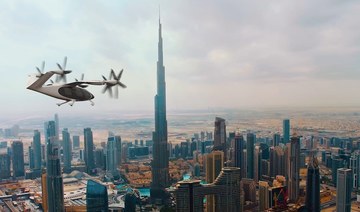CAIRO: The shared mobility technology landscape, which includes ride-sharing, car-renting and taxi-ordering models, has been on the rise in the Middle East and North African region ever since global players such as Uber and Lyft rode a wave of success in the business.
After producing several unicorns, the shared mobility market in the region is set to expand with a compound annual growth rate of 18.4 percent from 2022 to 2030 as the annual market is predicted to witness a 16.9 percent increase, according to Grand View Research Inc.
Arab News has compiled a list of the 10 most funded mobility-tech startups from the MENA region.
1. Careem
Total funding: $771.7 million
Founders: Mudassir Sheikha and Magnus Olsson
Investors: Alpha Partners, Arzan Venture Capital, BECO Capital, Bild Alternative Investment, Coatue Management and 22 others
Headquarters: UAE
Recognized to be the Middle East’s first unicorn startup, Careem has transformed the ride-hailing sector in the region, attracting global competition and acquisitions to the industry.
The company first started as a car-booking app. It later entered the food delivery space and now operates as a super app.
Founded in 2012, Careem is the second most funded startup in the region. It obtained unicorn status in 2018 and was later acquired by global ride-hailing giant Uber for $3.1 billion in 2020.
2. Swvl
Total funding: $264 million
Founders: Mostafa Kandil, Mahmoud Nouh and Ahmed Sabbah
Investors: BECO Capital, Endeavor Catalyst, MSA Capital, Oman Technology Fund, Arzan Venture Capital, Sawari Ventures, VNV Global, Queen’s Gambit Growth Capital and others
Headquarters: Founded in Egypt, based in the UAE
Founded in 2017, Swvl is a tech-enabled mass transit solutions provider offering intercity, intracity, business-to-business and business-to-government transportation services.
The company is another unicorn founded in the MENA region, also listed on the Nasdaq.
Currently operating in 20 countries across four continents, Swvl went public after it completed a merger with special purpose acquisition company Queens Gambit Growth Capital and was valued at $1.5 billion in March 2022.
3. Yassir
Total funding: $43 million
Founders: Noureddine Tayebi and El-Mahdi Yettou
Investors: Y Combinator, P1 Ventures, French Partners, ACE & Co., Venture Souq, WndrCo, DN Capital, Kismet Capital, Spike ventures, Quiet Capital, Endeavor Catalyst, FJ Labs, Venture Souq, Nellore Capital, Moving Capital and other investors
Headquarters: Algeria
Established in 2017, Yassir offers on-demand services such as ride-hailing and last-mile delivery in 25 cities across Algeria, Canada, France, Morocco and Tunisia, with over 3 million users.
The startup started as a ride-sharing platform and later became a super app adding last-mile delivery and financial services for its users.
The company raised $30 million in series A funding in June 2021 in a bid to expand into Western Africa and Europe in 2022.
4. ekar
Total funding: $34 million
Founder: Vilhelm Hedberg
Investors: Polymath Venture and other investors
Headquarters: UAE
Founded in 2016, ekar offers on-demand access to a network of car-share, subscription leasing vehicles and other mobility options, including peer-to-peer rentals.
Operating across seven cities with a fleet of 2,300 vehicles and 250,000 users in Saudi Arabia and the UAE, the company is one of the region’s first fully contactless car-sharing apps.
The company raised $17.5 million in series B funding in 2019, announced its launch in Thailand in 2022 and plans to expand into Malaysia, Turkey and Egypt later in the year.
5. KOI Ride
Total funding: $18 million
Founders: Ghassan Muradwij and Riyaz Alambath
Investors: Undisclosed
Headquarters: UAE
KOI Ride is a B2B ride-hailing service startup that offers end-to-end ground transport services and connects online booking portals with licensed transportation providers.
Established in 2015, the company offers its services in over 30 countries. In June 2022, KOI Ride raised $3 million in an investment round to strengthen its presence in existing markets.
6. Udrive
Total funding: $17.3 million
Founders: Nicholas Watson and Hasib Khan
Investors: Cultiv8 and Oman Holding International
Headquarters: UAE
Another car rental app Udrive provides a pay-per-minute rental service for UAE residents and tourists, clocking in over 2 million trips.
Founded in 2016, the company allows users to pick up a car from any location available and is then returned to any parking location in the same city.
In its latest funding round, Udrive raised $5 million to support its plans to expand in the Middle East and enhance its technology.
7. Fenix
Total funding: $5 million
Founders: Jaideep Dhanoa and IQ Sayed
Investors: Emkan Capital and Panthera Capital Ventures
Headquarters: UAE
Established in November 2020, Fenix provides a different kind of mobility using electric scooters on a subscription-based service.
Founded by two ex-Careem executives, the company has one of the largest electric vehicle fleets in the region as it operates in four cities.
In 2021, the company raised a $5 million seed funding to support its goals to become the first national micro-mobility operator in the Gulf Cooperation Council.
8. Telgani
Total funding: $4.2 million
Founder: Abdulkader Almkinzy
Investors: 500 Startups, Saudi Venture Capital Co., Impact46 and others
Headquarters: Saudi Arabia
A car rental platform, Telgani allows users to rent a car through its mobile app that is then delivered to their doorstep.
Founded in 2018, the company also enables users to pick the car and the location they want to travel to and provides them with nearby options.
In November 2021, Telgani secured a $2.5 million pre-series A funding led by Saudi venture capital firm, Impact46.
9. Ousta
Total funding: $3.1 million
Founder: Nader El-Batrawi
Investors: Angel investors
Headquarters: Egypt
Founded in 2016, Ousta is Egypt’s first local ride-sharing application that was established to compete with ride-hailing companies Uber and Careem.
The company did not disclose any of its operations to the media since its fundraising of $1.5 million in 2016.
10. Urent
Total funding: $1.5 million
Founder: Omar Al-Ashi
Investors: Viacheslav Zhuravlev
Headquarters: UAE
Urent, another player in the car rental space, is a UAE-based platform aiming to revolutionize the car rental industry in the region.
The company offers a peer-to-peer vehicle sharing platform, creating a whole community based on trust.
It is dubbed to be the Airbnb for cars.
In June 2019, Urent raised seed funding and, in 2020, raised an undisclosed pre-series A funding, and will be operating globally by Q4 2023.




















